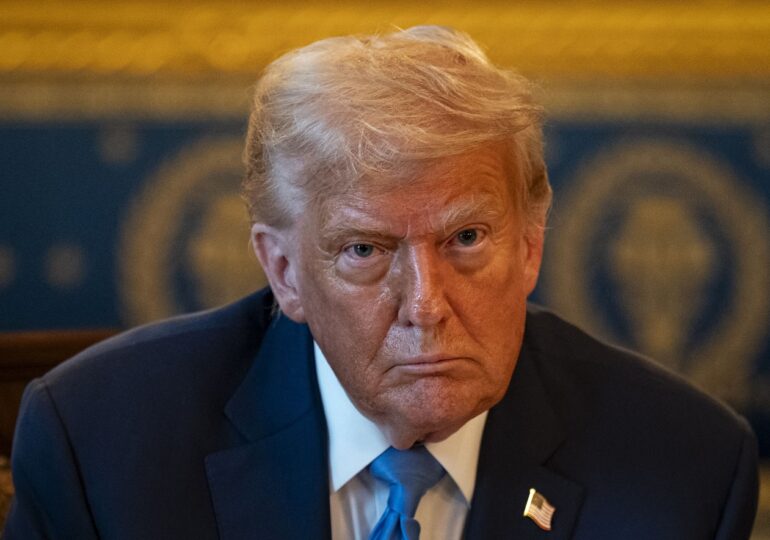President Donald Trump is becoming increasingly frustrated with how his administration has handled the public outrage surrounding the Jeffrey Epstein case, which dominates the news and overshadows his agenda.
The president’s exasperation comes after weeks of mistakes and a lack of clear strategy among high-ranking officials, who underestimated the outrage, especially from the president’s electoral base, and hoped the country would forget about the unpublished Epstein files and move on, said 10 people familiar with the situation, many of whom spoke on condition of anonymity to The Washington Post.
- Trump wants to get rid of the Epstein legacy, but the scandal is growing and threatening MAGA
- Five key questions about the relationship between Donald Trump and Jeffrey Epstein
"It's quite a substantial distraction," one of these individuals said. "While many try to maintain unity, in many ways, the Department of Justice and the FBI are on the verge of nervous breakdown. Many wonder how long this situation will last for all parties involved, whether it's the FBI director or the attorney general," said the source for the American publication.
Despite his frustration, Trump has hesitated to make personnel changes, according to another source close to the president: "He doesn't want to create an even bigger spectacle by firing someone," this person said.
At the center of the storm is Attorney General Pam Bondi, who has made the release of FBI files on Epstein one of her emblematic initiatives for months. Her commitment has intensified protests from Trump's right-wing electoral base over the non-disclosure of the files, amid speculation that undisclosed evidence could involve wealthy and powerful friends of financier and sex offender Epstein.
The distraction attempt failed
Over the July 4 weekend, Bondi, her deputy, and FBI leaders approved a memorandum on the Epstein files, sparking a new storm. The note stated that the Trump administration found no evidence to dispute that Epstein died by suicide in prison in 2019 and that there is no "client list" compelling them to criminally pursue anyone else.
Additionally, the memorandum specified that no further documents would be released to protect the privacy of the victims. Since then, a wave of criticism has engulfed all three branches of government, providing Democrats with a new strong line of attack and leaving Trump struggling to respond to the most challenging political crisis he has faced since his return to the White House.
For weeks after the memorandum's release, Trump and Bondi spoke on the phone almost every day, as they usually do, according to two people familiar with the conversations, amid a negative reaction that, unlike previous controversies stirred by the president, has refused to fade from the headlines.
A series of constant announcements from the administration have failed to quell the agitation, including the release of FBI files on the assassination of Reverend Martin Luther King Jr., a recently launched investigation against former FBI Director James B. Comey, and even an explosive accusation of treason against former President Barack Obama in connection with the 2016 presidential elections.
And polls continue to show that the public is skeptical of what the government tells them about Epstein. "We've had the greatest six months in our country's history, and all the fake news wants to talk about is the Jeffrey Epstein hoax!" Trump erupted on Truth Social this month.
Conflict between the Department of Justice and the FBI
Attempts to appease Trump supporters with more information about Epstein have often raised even more questions, several people interviewed by The Washington Post said. They cited the FBI's release of security camera footage from 2019 outside Epstein's cell, aimed at proving that he committed suicide and debunking conspiracy theories that he was killed.
After the release, FBI Director Kash Patel and Deputy Director Dan Bongino realized that three minutes were missing from the footage they presented as "complete," according to three people close to the FBI. This omission further fueled speculation.
Bongino and Patel were involved in drafting, approving, and promoting the memorandum detailing their decision not to disclose more information from the files, according to emails reviewed by The Post and three people close to the president. But since the negative reactions intensified, both have privately complained that if they were in charge, they would have released the Epstein files, editing the information identifying the victims, according to two people familiar with private conversations.
In the following days, senior FBI and Department of Justice officials accused each other. Bondi accused Bongino of leaking information about handling the Epstein files to the press, according to three people familiar with the discussions. Bongino considered resigning from his important position, according to individuals familiar with his thinking and a social media post by his right-wing ally, influencer Laura Loomer, although he has so far decided to remain in his role.
Pressure intensified last week after the Wall Street Journal reported that Bondi told Trump, at a meeting in May in the Oval Office with Patel, that the president's name appeared multiple times in the files. The mere presence of Trump's name – or anyone else's – in FBI investigative documents does not necessarily suggest illegal activity. However, congressional Democrats seized on this revelation in an attempt to keep the focus on the case.

